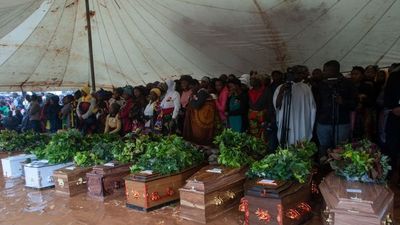Malawi’s President Says Half the Country Damaged by Cyclone Freddy
The death toll in Malawi has reached 447 people, with 282 residents missing and close to 400,000 people still displaced.
It has been a month since Cyclone Freddy ravaged Madagascar and then made a downfall in Malawi and Mozambique. But the aftermath of the tragedy still rages on. As more officials work to uncover the devastating effects of the cyclone that led to the loss of many lives, more details are surfacing.
In an interview with The Guardian published on Monday (March 20th), Malawi’s President Lazarus Chakwera said that over half of his country has been damaged by Cyclone Freddy.
“This demonstrates that climate change issues are real and we are standing right in the path of it,” Chakwera told The Guardian. Chakwera also stated that the devastation of the cyclone could very well keep Malawi in the cycle of poverty.
According to reports from the country’s authorities, the death toll in Malawi has reached 447 people, with 282 residents missing and close to 400,000 people still displaced. (When you factor in Mozambique and Madagascar, there have been close to 600 confirmed deaths.)
Cyclone Freddy first mounted in Australia before traveling across the Indian Ocean and settling in south-east Africa, where it destroyed property and killed residents across Mozambique, Madagascar, Zimbabwe and now, Malawi. This intense deadly storm has been dubbed one of the longest-lasting tropical cyclones ever recorded in history.
Chakwera also detailed the effects of the tragedy, stating that the country, which has a population of over 19 million people, was in dire straits.
“We need everyone’s help and support for this tragedy to be mitigated,” Chakwera said. “We are suffering and we can’t meet the needs. We have set up temporary camps and food is needed, shelter, yes, but must go past that and build stronger because of the damage.
There is also concern over an elevated cholera risk; since last year, there has been a cholera outbreak that has killed more than 1,700, making it one of the deadliest on record. Those numbers are now expected to go up.
“With the floods, people’s toilets have been washed away and most people have no access to safe drinking water,” Storn Kabuluzi, health services director, said.
- Interview: How Climate Change is Bringing Deadly Cyclones to East Africa ›
- Worst Cyclone In Southern Africa's History Kills 190 ›
- Cyclone Freddy Rears its Head in Malawi - OkayAfrica ›
- Madagascar Bans Public Protests Ahead Of Elections - OkayAfrica ›
